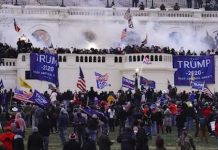
Collectively, our nation witnessed one of the darkest days in modern American history. The armed attack by thousands of Trump supporters on the U.S. Capitol on Jan. 6 had one simple goal: to employ violence to prevent the certification of the 2020 presidential election winners Joe Biden and Kamala Harris, and Trump’s defeat. The assault by these domestic terrorists resulted in the deaths of five people, including a Capitol police officer. There are credible reports that some of the insurrectionists who attacked the seat of American democracy planned to take House members and senators hostage, with some of these right-wing vigilantes posting their plans to execute those they captured on social media, including hanging Vice President Mike Pence.
The failure of law enforcement to prepare adequate security at the Capitol building in advance of the Jan. 6th attack – and to respond to the assault once it was underway, has provoked grave questions about the inaction of Trump-appointed officials in charge. Weeks in advance, U.S. intelligence agencies were well aware that white supremacist, right-wing extremist and militia groups were openly planning to smuggle firearms and other weapons into Washington to provoke violence at the Capitol on Jan. 6.
Between The Lines’ Scott Harris spoke with Jason Stanley, the Jacob Urowsky professor of philosophy at Yale University and author of “How Fascism Works: The Politics of Us and Them.” Here, Stanley examines the roots of the violent Jan. 6 insurrection at the Capitol, and the ongoing threat posed to U.S. democracy by Trump loyalists and elements of the Republican Party that have embraced white supremacy, and authoritarianism.
JASON STANLEY: We see the results of the violent rhetoric that President Trump has indulged in since he’s announced his run for office in summer 2015. The way he speaks of his political opponents incites among his supporters extreme violence. It’s violent rhetoric that represents his opponents as traitors, as enemies. And it seems like a game until it isn’t. Again and again, history teaches us that the proppings of the violence, propaganda and rhetoric seems like a game. You get used to it. And suddenly, you realize there’s a group of people taking it seriously. And we’ve witnessed that yet again. I’m guessing that it could have been much worse than it in fact was. (Security) could have also been much better if there had been advanced planning, if there had been the kind of planning that there had this been a Black Lives Matter protest or Occupy Wall Street — obviously much more peaceful events. But as Alex Vitale pointed out the other day in a piece, when it’s white nationalists and far right, the police and law enforcement do not plan on violence. And when it’s leftists or black Americans protesting police brutality, they expect much greater violence than there is.
We have seen years and years of rhetoric portraying Trump’s political opponents, minorities and immigrants as well, as fundamental enemies of the people. And this rhetoric takes a long time to crystallize into action. So we’re seeing now the action.
SCOTT HARRIS: Professor Stanley, people all across this country on the left and right honor the First Amendment, free speech. Yet we have several media outlets in this country. We’re talking about Fox News, One America News network, OAN, Newsmax and host of social media sites that not only propagate lies, but incite violence. And we saw that culmination of violence on Capitol Hill on Jan. 6. The First Amendment was never meant to be a suicide pact, but we have to be careful. What do you think we need to do as a nation to reign in and suppress those voices out there that are calling for violence and overthrow of our government?
JASON STANLEY: So let’s be clear in John Stuart Mill’s defense of free speech in “On Liberty,” one of the great documents of philosophy, he argues that that we should allow full free speech on the assumption that there are social sanctions when the powerful use speech against less powerful people, against the powerless. He’s assuming that society punishes those who speak, who use words and violence in dangerous ways. You know, it’s long been known that free speech is both a pillar of democracy and also a poison pill of democracy. Plato points this out 2,300 years ago in Book Eight of the Republic. He says democracy will lead straight to tyranny because democracy allows free speech and a tyrant will come and present himself as the protector of some group of people who he represents as a mortal danger. And he will split the nation representing himself as the nation’s protector, and then come to power and end democracy.
So this is exactly what we’ve seen. We’ve seen Plato’s prediction come to fruition which we will always see if we don’t have some kind of societal protection. So this is a philosophical problem with democracy. It doesn’t mean we can give up democracy or free speech, but it means that we have to recognize that the situation we face is a situation that faces democracy as a system. And so we have to be aware of it. We have to deal with it I think in the way that Mill suggested, by making sure that we weigh when we have politicians engaging in the kind of insurrectionist rhetoric that say, Sen. Hawley and Sen. Cruz did and many, many representatives — that they face consequences. Social consequences, possibly other consequences as well.
For more information, visit Jason Stanley’s website at Jason-Stanley.com.




